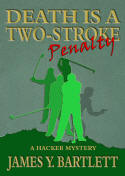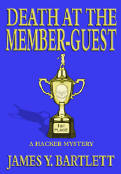The Hacker Mysteries
I sometimes go to bookstores that keep old and used books on their shelves, along with the latest bestsellers.
For some genres, such as mysteries, there are some real gems to be found in the back sections. That’s how I discovered the smart-aleck charms of Nero Wolfe, and Dick Francis’s remarkable string of mysteries revolving around the sport of horse-racing.
The story lines for both series might seem a little dated at first, based on some of the atmospheric details. On the other hand, the novels were uniformly entertaining and sometimes compelling. They easily deserved the long shelf life that these bookstores helped to extend.
In some respects, the Internet has also breathed new life into these and similar books. Used bookstores can now reach out to vastly wider audiences than the drop-by trade. This not only helps the booksellers, but can also furnish the spark to revive some fictional characters that gave a previous generation several hours of enjoyment.
Fifteen years ago, for example, long-time golf writer James Y. Bartlett tried his hand at a golf mystery series featuring Pete Hacker, a former touring pro who filed away his clubs and switched to filing golf stories for the Boston Journal. The first book, Death Is A Two-Stroke Penalty, put Hacker in the middle of the action on the southern swing of the PGA Tour.
The folks at Yeoman House have reprinted this and another Hacker mystery in paperback, and Bartlett’s now added a brand-new Hacker mystery to the mix.
I doubt this would have happened if it wasn’t for the beneficial effect of the Internet and its broad marketing reach.
It’s easy to tell when the first Hacker mystery appeared, just by its references to the top prize money won by the pros. In addition, some of the real-life PGA Tour stars that are mixed in among the fictional professionals Hacker “covers” are now enjoying life on the Senior Tour.
That doesn’t take anything away from a good story. Hacker follows the Tour as the professional golf circus moves to a new golf course near Charleston, South Carolina. The club seems suspiciously similar to the Kiawah Island masterpiece that hosted the 1991 Ryder Cup “War by the Shore,” which I doubt was coincidental considering the book’s original publication date.
A promising young tour professional seems to have more than a spiritual run-in with an evangelical minister, who appears to believe that charity begins at home. In the meantime, there are a few other problems Hacker must deal with, including drug-dealing caddies and golf groupies. In addition, a death on the golf course disrupts the usually quiet excitement of the tournament, and Hacker finds himself in the middle of it—naturally.
The next book in the series, Death From The Ladies Tee, was first published in 1992. Hacker’s still writing about golf for the fictional Boston newspaper, and his preference for writing about the PGA Tour is obvious. On the other hand, he can’t resist an invitation from an LPGA marketing staffer who uses a combination of good looks and family connections to convince Hacker to fly down to Miami for a tournament at Doral’s Blue Monster.
Hacker discovers how the LPGA players work around their strength disadvantages compared to the men, and not just on the golf course. Hacker also learns that intolerance based on sexual preference can cut both ways, sometimes with deadly consequences.
The action now fast-forwards twelve years to the most recent book in the series, Death at the Member-Guest.
This time Hacker is trying to figure out how to coast through the fall golf season and then do as little as possible during the long winter layover in New England, before the PGA Tour begins its next season. Hacker’s editor has other ideas, including the notion that an intern from a Boston college journalism program should learn his trade at Hacker’s feet.
When a college buddy invites the veteran reporter to a weekend Member-Guest event at a posh country club in nearby Lowell, Hacker comes up with a scheme to have the intern take over coverage of the B.C. Open, so Hacker can have his fun.
He quickly re-learns the lesson that no good plan goes unpunished. The unpopular club president turns up dead during the tournament, and there are more than enough suspects. The possibility of a mob connection to the murder also attracts unwanted media attention. For once, Hacker has to figure out how to stay out of the paper, while also staying out of the clutches of some decidedly nasty folks.
These books are fun to read, and frequently give a credible insider’s view of professional golf and the writers who cover the sport. It wouldn’t surprise me if Bartlett found himself writing another book in the series, perhaps about the Champions Tour.
Review date: March 20, 2004




